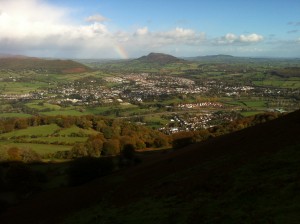In his huge, extraordinary book The Master and His Emissary Iain McGilchrist writes this:
“If you are a bird…you solve the conundrum of how to eat and stay alive by employing different strategies with either eye: the right eye for getting and feeding , the left eye for vigilant awareness of the environment. More generally , chicks prioritise local information with the right eye and global information with the left eye.”
Information from the right eye is relayed to the left brain, and the left eye to the right. The left brain is responsible for focused attention, and the right brain for more or less everything else but particularly, vigilance.
The more focused your attention, almost by definition, the more likely you are able to ignore the world around you.
In Syracuse in 212BCE Archimedes, concentrating on the geometry of conic sections, failed to hear the approach of Roman soldiers, who killed him moments later. Concentration can block the world out. Focused thinking, particularly when we’re trying to solve a problem, obliterates everything else.
Intelligence is a measure of focused thinking. The testing and examination regime of the English and Welsh education systems rewards the focused thinker at the expense of the mind that is more open, less able to follow a line of thinking, more likely to wander off into a daydream. Yet the daydreamers are often the creative thinkers, the ones who need time, not pressure, to succeed.
Liam Hudson, writing in 1966, grasped this in his book Contrary Imaginations. He developed a series of tests to show that the focused thinker, (he used the term convergent thinker) although able to solve mathematical and closed problems, was not so able to find creative solutions. Very often, the vigilant thinker (Hudson calls these divergent) those whose brains, for whatever reason, are more likely to wander, can provide endless solutions when the focused thinker, the one on the hunt, can find very few. The convergent thinker, says Hudson, tends towards maths and sciences, the divergent towards the arts.
Guy Claxton, in his 1998 book Hare Brain Turtle Mind suggests that the regimented learning model of recent times prevents the unconscious mind from finding answers. Creativity is blocked. And as Iain McGilchrist in The Master and His Emissary elucidates, what is at stake is of paramount importance.
In the test driven school system, the focused thinker is the winner. In turn, these students achieve results, gain university places, the higher paid jobs. Think of the terms ‘target’ ‘aim’ objective’ – which mode of thinking do these suggest? It’s obvious. The education system has built in prejudice.
It follows that positions of authority and power are often filled by the focused, convergent, target driven thinker, who assumes that the way he or she learnt must be the only way, and so the process is continued.
Meanwhile, the creative thinkers, the vigilant, divergent daydreamers and creators, are squashed, their talents exiled to the remote and undervalued regions of the education system. It’s a waste, and it’s damaging, and as I hope to explore in a later blog, one contribution to the growing epidemic of mental illness.
